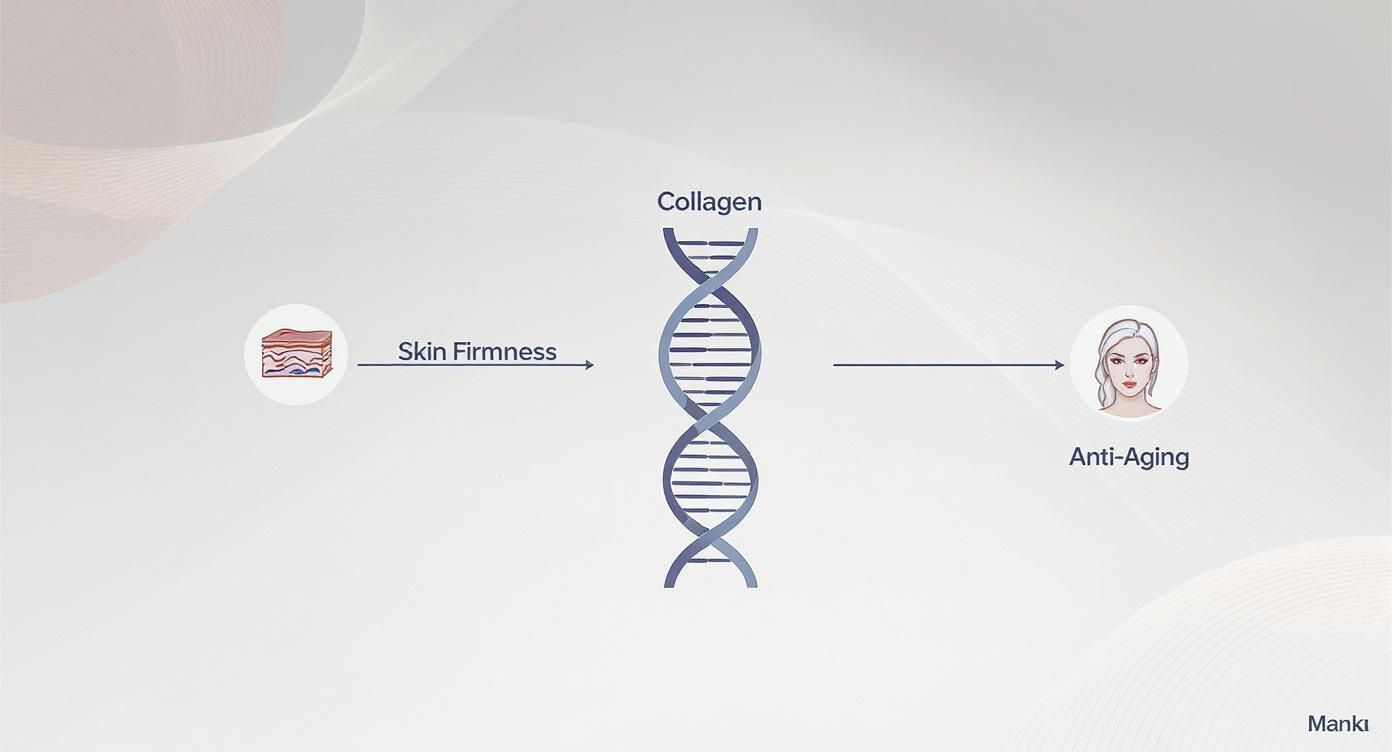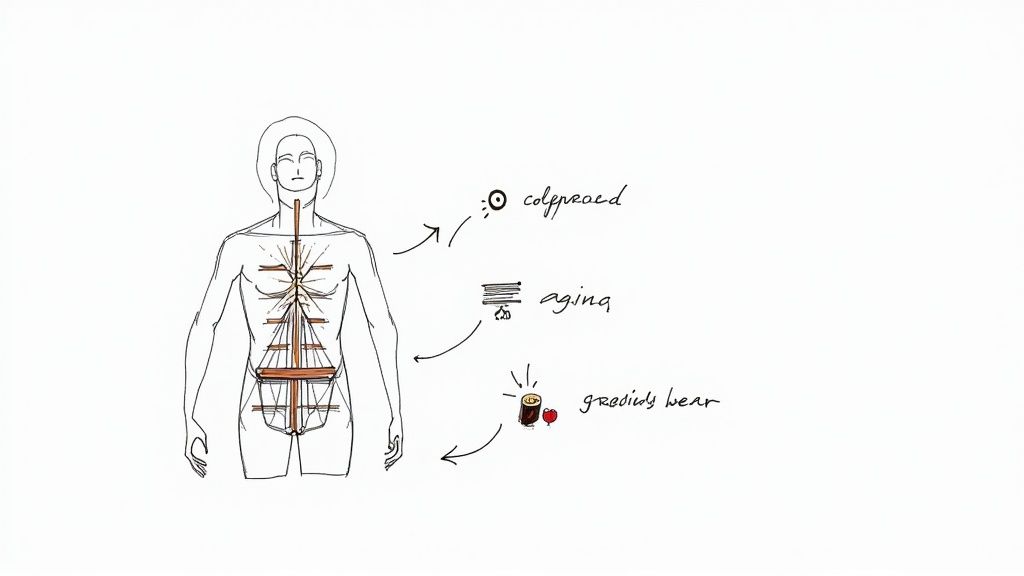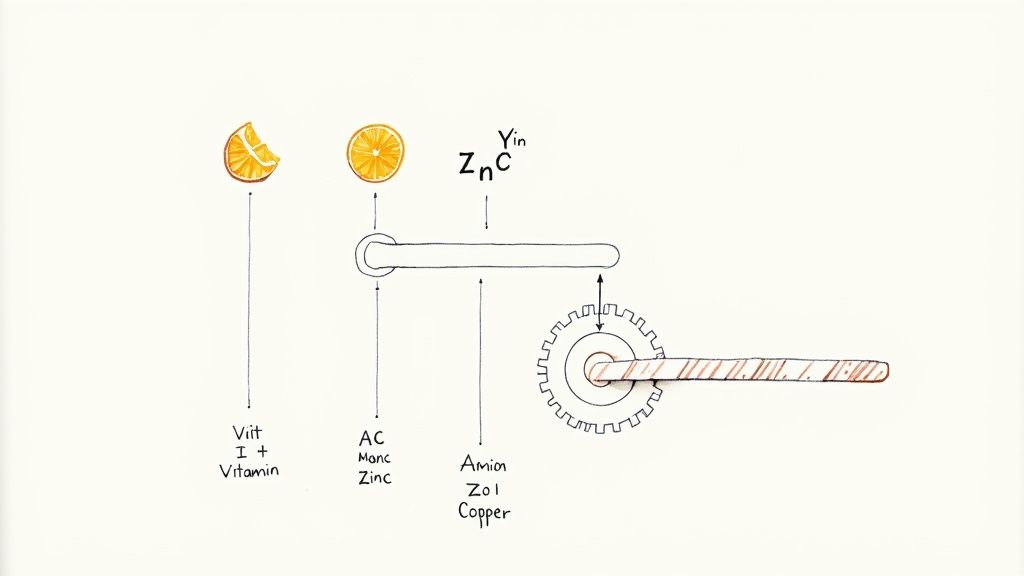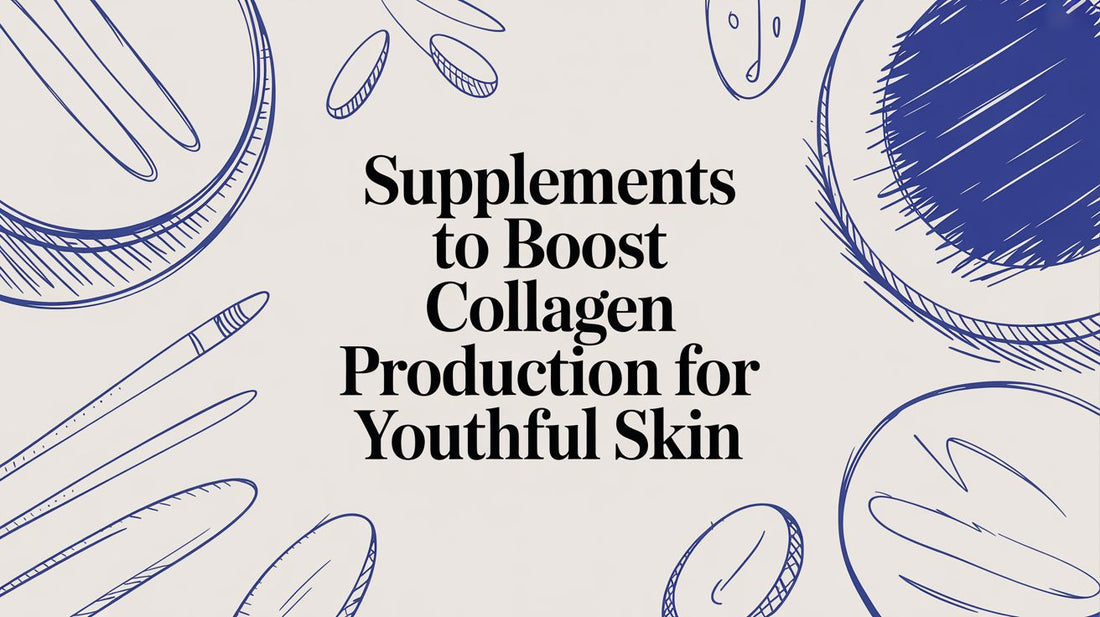Think of collagen as the structural scaffolding that gives your skin its bounce and firmness. The smartest supplements to boost collagen production don't just supply more of this protein; they give your body the exact raw materials it needs to build its own—a critical process that, unfortunately, gets less efficient the older we get.
Understanding How Your Body Builds Collagen
Imagine your body as a busy construction site. Collagen is the high-tech scaffolding holding the entire structure together—strong, flexible, and absolutely essential. It’s the most plentiful protein we have, giving integrity not just to our skin, but to our bones, joints, and all the connective tissues in between. If you want a deeper dive, you can learn more about what collagen is and why it's so important in our detailed guide.
The catch? This internal construction crew starts to slow down over time. Beginning in our mid-20s, our bodies start producing about 1% less collagen every single year. This decline gets a push from things like sun exposure, pollution, and even some of our lifestyle habits. The result is what you'd expect: the scaffolding weakens, leading to those tell-tale signs of aging like fine lines, wrinkles, and skin that just doesn't feel as firm as it used to.
The Shift Towards Endogenous Production
So, instead of just dropping off pre-made scaffolding (like animal-based collagen) at the site, a better approach is to re-energize your own crew. Give them the high-quality tools and materials they need to get back to building. This is exactly where supplements designed to boost your body's own production come into play.
This strategy is all about nourishing your body's internal machinery for making collagen. By supplying specific vitamins, minerals, and amino acids, you’re essentially empowering your system to rebuild and maintain its own youthful structure from the inside out.
This infographic really helps connect the dots between having healthy collagen levels and the anti-aging benefits we're all after.

As you can see, collagen is central to skin firmness and the fight against aging. It's no surprise that this growing awareness has sent the market for collagen-supporting products soaring.
People everywhere are looking for proactive ways to support their skin and joint health. The market for collagen supplements was already valued at around USD 2.47 billion in 2025 and is on track to hit USD 3.65 billion by 2032. This isn't just a trend; it's a major shift toward wellness from within. You can discover more insights about the collagen supplement market growth on coherentmarketinsights.com.
To truly support this internal factory, we first need to get to know the key players—the 'construction crew' of nutrients that make it all happen. In the next sections, we'll break down the specific supplements that act as the building blocks and catalysts for strong, healthy collagen production.
The Catalysts: Vitamin C, Zinc, and Copper
So, you have the amino acids—the high-quality bricks for building collagen. But bricks don't just assemble themselves into a sturdy wall. You need a skilled crew and the right tools. In your body's collagen factory, that crew is a team of key vitamins and minerals that kickstart the entire process.
Without these crucial cofactors, production grinds to a halt. The most important members of this team are vitamin C, zinc, and copper. Each one has a distinct, non-negotiable role in making sure the collagen your body builds is both plentiful and strong. Understanding how they work is key to finding effective supplements to boost collagen production.

Vitamin C: The Master Weaver
Vitamin C is probably the most famous nutrient linked to collagen, and for good reason. Its main job is a process called hydroxylation. Think of it as the master weaver that expertly interlinks amino acids into strong, stable chains.
If you don't have enough vitamin C, these chains end up weak and flimsy, leading to fragile tissues. This is exactly why a severe deficiency, known as scurvy, causes symptoms like bleeding gums and poor wound healing—the body simply can’t produce functional collagen.
While scurvy is rare today, even slightly low levels of vitamin C can impact your body’s ability to create the high-quality collagen needed for healthy skin.
Key Takeaway: Vitamin C is essential for stabilizing the collagen molecule and forming its triple-helix structure. It acts like the "glue" holding everything together, making it a must-have in any collagen-support plan.
Some of the best food sources for vitamin C include citrus fruits, berries, bell peppers (especially red and yellow ones!), leafy greens like kale, and tropical fruits like kiwi.
Zinc: The Site Foreman
If vitamin C is the weaver, then zinc is the on-site foreman who gets the machinery running. It works as a cofactor for several key enzymes, including one called collagenase. This enzyme is vital for remodeling collagen—it helps break down old, damaged fibers to make way for fresh, healthy ones.
Zinc also contributes to protein synthesis and cell division, two processes that are fundamental for repairing skin and building new tissue. A zinc deficiency can slow this whole cycle down, making it harder for your body to maintain a strong collagen matrix.
Copper: The Finishing Touch
Once the new collagen fibers are woven and in place, copper comes in to add the finishing touch. It gives them their incredible strength and flexibility. Copper activates an enzyme called lysyl oxidase, which is responsible for creating cross-links between collagen and elastin fibers.
These cross-links are what give your skin its tensile strength and resilience, allowing it to stretch and snap back into place. Without enough copper, the collagen framework would be weak and far less effective.
To make this crystal clear, here’s a quick summary of how these essential cofactors work together to support your body's natural production.
Key Nutrients for Collagen Synthesis
| Nutrient | Role in Collagen Production | Excellent Dietary Sources |
|---|---|---|
| Vitamin C | Enables the linking of amino acids | Citrus fruits, bell peppers, berries, leafy greens |
| Zinc | Activates enzymes for collagen remodeling | Nuts, seeds, whole grains, legumes |
| Copper | Creates cross-links for strength & elasticity | Dark chocolate, shiitake mushrooms, leafy greens, seeds |
Providing your body with amino acids is just one piece of the puzzle. To truly support your ability to build and maintain healthy tissues, you have to supply these essential catalysts, too. A well-rounded formula acknowledges this synergy, which is why a thoughtful approach to formulation is so important.
The Raw Materials: Glycine, Proline, and Lysine
If vitamins and minerals are the skilled construction crew for collagen, then amino acids are the actual bricks and mortar. You can have the best team in the world, but they can't build anything without raw materials. For collagen, those essential building blocks are amino acids.
Three in particular are the undisputed stars of the show: glycine, proline, and lysine. Together, they make up the vast majority of your collagen protein. When you give your body a steady supply of these specific aminos, you're essentially stocking the construction site with premium materials, making the whole building process run smoother and more efficiently.
This is the core idea behind effective supplements that boost collagen production—providing the exact materials your body needs to get the job done.

Glycine: The Backbone of Collagen
Glycine might be the smallest and simplest amino acid, but its role is massive. It’s the most common amino acid in collagen, accounting for roughly one-third of its entire structure. Its tiny size is its superpower, allowing the long collagen protein to wind into its signature tight, triple-helix shape.
This dense, coiled structure is exactly what gives collagen its incredible strength and resilience. Without enough glycine, your body simply can’t form this foundational helix properly, and any collagen it produces will be unstable and weak. Supplementing with glycine ensures this primary building block is always on hand.
Proline and Lysine: The Structural Specialists
Right behind glycine in importance are proline and lysine. These two amino acids get a crucial upgrade from vitamin C (in a process called hydroxylation) to become hydroxyproline and hydroxylysine. Think of these modified forms as the rivets that hold the entire structure together, making it stable and strong.
- Proline provides essential rigidity and strength to the winding helix.
- Lysine is key for creating cross-links between different collagen fibers, which gives tissues their strength and elasticity.
Together, this powerful trio forms the very essence of what collagen is.
A great way to picture it is to think of collagen as a thick rope braided from three smaller strands. Glycine makes up the bulk of each strand, while proline and lysine are woven in at key points to add strength, stability, and keep the rope from unraveling under pressure.
The Science Behind Supplementing with Amino Acids
Giving your body these specific amino acids is more targeted than just eating a high-protein meal. It delivers a direct supply of the exact components needed for collagen synthesis, helping to bypass any dietary gaps or limitations. And research shows this targeted approach pays off.
Studies have linked a healthy supply of glycine, proline, and lysine to real, tangible benefits. High availability of these aminos can directly support the body’s ability to repair and rejuvenate tissues, which often translates to visible improvements in skin hydration and elasticity as the body rebuilds a firm dermal matrix.
And since collagen is a major part of cartilage, many people also report better joint comfort when their bodies have these key amino acids readily available. When it comes to supporting your body from the inside, understanding what's inside a clean collagen booster and why each ingredient is there is the key to seeing real results.
By directly supplying these fundamental raw materials, you’re empowering your body’s natural collagen factory to work at its best. This strategy doesn't just support your skin's appearance—it strengthens the underlying health of all your connective tissues, laying the foundation for lasting vitality from the inside out.
Here's the rewritten section, crafted to sound completely human-written and natural, following the provided style guide and examples.
Can You Boost Collagen with Plants?
So far, we’ve covered the direct approach: giving your body the amino acid building blocks it needs. But there’s another, equally powerful strategy that’s really catching on. It’s all about using smart, plant-based ingredients to kickstart your body’s own collagen-making engine.
Think of it this way: instead of just dropping off a pile of bricks (the amino acids), this method also sends in the construction crew and a security team.
First, it delivers key nutrients that tell your internal collagen factory to get to work. Second, it provides a team of potent antioxidants to protect your existing collagen from the daily grind of environmental damage. It's a two-pronged approach that helps you build new collagen and hang onto what you’ve already got.
This isn’t just a niche idea; it’s part of a huge shift toward smarter, plant-derived wellness. The global market for collagen supplements was already worth USD 3.77 billion in 2023 and is expected to more than double to USD 7.5 billion by 2035. This boom is driven by people wanting effective, science-backed options, including the very plant-based boosters we're talking about now. You can see the full collagen market analysis on marketresearchfuture.com.
Silica from Bamboo: The "Mortar" for Your Collagen
One of the real stars in the plant-booster world is silica, and bamboo extract is one of the richest sources you can find. If you think of amino acids as the "bricks" that build your collagen, then silica is like the mortar that holds them all together.
Silica is a trace mineral that’s absolutely essential for putting collagen together and making it stable. It helps form the critical cross-links between collagen fibers, which is what gives your skin its firmness and bounce. Without enough silica, your collagen framework can end up flimsy and weak.
By supplying a concentrated dose of this mineral, bamboo extract helps ensure that the collagen your body is making is strong, stable, and built to last. It’s a true foundational piece for a healthy connective tissue system.
Amla & Sea Buckthorn: Your Collagen’s Bodyguards
Making new collagen is only half the job. You also have to protect it. Every single day, your skin is under attack from things like UV rays and pollution, which create nasty little molecules called free radicals. These troublemakers cause oxidative stress, which literally eats away at your collagen fibers.
That’s where powerful plant-based antioxidants step in to save the day.
-
Amla (Indian Gooseberry): This little fruit is a vitamin C superstar, packing one of the highest concentrations found in nature. We already know vitamin C is non-negotiable for making collagen, but it’s also a fierce antioxidant that neutralizes free radicals before they can wreck your skin’s structure.
-
Sea Buckthorn: Another antioxidant hero, sea buckthorn is loaded with vitamins C and E, plus a host of other protective compounds like carotenoids and flavonoids. This team of nutrients works together to shield your collagen from all angles.
This protective strategy is like hiring a dedicated security team for your collagen. By neutralizing threats from free radicals, these antioxidants ensure the collagen you’ve worked so hard to build remains strong and functional for longer.
This dual approach of building and protecting is what makes plant-based boosters such an intelligent choice. They don't just focus on one part of the puzzle; they support the entire collagen lifecycle. It’s about giving your body the tools it needs to create fresh, high-quality collagen and preserve the youthful foundation you have, leading to real, visible results from the inside out. It's truly one of the most well-rounded supplements to boost collagen production available.
Building Your Daily Collagen Support Routine
Knowing the science behind collagen is one thing, but actually turning that knowledge into a daily habit is where you'll start seeing results. It’s not just about picking a supplement off the shelf; it's about creating a sustainable practice that fits seamlessly into your life and nourishes your body from the inside out.
The supplement market has exploded recently, which shows how many people are catching on to the benefits. The U.S. collagen supplement market was already valued at over USD 1 billion in 2024 and is expected to hit nearly USD 1.77 billion by 2032. This isn't just a fleeting trend—it’s driven by a real demand for products that support skin elasticity and joint health, especially clean, non-GMO options. Learn more about the rising preference for high-quality collagen products from Data Bridge Market Research. With so many choices out there, it pays to know what you're looking for.
How to Choose a High-Quality Supplement
Walking down the supplement aisle can feel pretty overwhelming. But don't worry—a few key markers can help you spot a genuinely great product. What sets a superior supplement apart is a combination of clean ingredients, honest transparency, and a well-designed formula.
When you're comparing your options, keep these three things in mind:
-
Decode the Supplement Label: A great formula will have a clear, simple ingredient list. It should proudly highlight its active ingredients—like bamboo extract for silica, key amino acids like glycine and proline, and essential vitamins like C—without a laundry list of strange fillers, artificial colors, or sugars. The label should give you confidence, not confusion.
-
Prioritize Third-Party Testing: The supplement industry isn't as tightly regulated as you might think, so independent verification is your best friend. Look for seals from organizations like NSF or notes that say the product has been tested by a third-party lab. This is your guarantee that what's on the label is actually in the bottle and that it's free from nasty contaminants.
-
Avoid Unnecessary Fillers and Additives: High-quality supplements to boost collagen production are all about delivering the good stuff efficiently. Stay away from products that are padded with bulking agents, fake sweeteners, and synthetic flavors. They don't offer any real benefit and can sometimes even mess with your digestion.
Pro Tip: A brand that’s proud of its product will be an open book. Look for companies that talk openly about where they source their ingredients and their manufacturing standards. That kind of transparency is usually a dead giveaway for a product you can trust.

Finding the Best Time for Your Routine
Probably the most common question I hear is, "When should I take my collagen booster?" The good news? The answer is incredibly flexible. The most important thing is simply being consistent. Finding a time that works for you and sticking with it is what truly matters.
Here are a few popular approaches to try:
- In the Morning: A lot of people love mixing their supplement into a morning smoothie, a cup of coffee, or even just water. It’s a great way to start the day on a healthy note and check it off your to-do list early.
- With a Meal: Taking your supplement with food can sometimes help your body absorb certain nutrients better. It can also be a bit gentler if you have a sensitive stomach.
- Before Bed: There's a theory that taking collagen-boosting nutrients at night syncs up with your body's natural repair cycles that kick in while you sleep.
At the end of the day, your body is smart—it will put those nutrients to work regardless of the exact time you take them. The most effective strategy is the one you can stick to without thinking. Whether it's in your post-workout shake or your evening tea, the magic happens when it becomes a non-negotiable part of your daily wellness ritual. That habit is your biggest step toward seeing real, lasting results for your skin, hair, and joints.
Common Questions About Collagen Supplements
Diving into the world of supplements can feel a little overwhelming, and it's totally normal to have questions. As you start looking for ways to support your body's own collagen production, you’re probably wondering what to expect, what works, and how long it all takes. Let's clear up some of the most common questions.
My goal here is to give you the confidence and clarity you need to choose the best path forward for your own wellness goals.
How Long Until I See Results?
Patience and consistency. When it comes to rebuilding collagen, those are the two most important things to remember. Your body works on its own schedule, slowly and steadily rebuilding its internal structure. This isn't an overnight fix; it's a long-term commitment.
While everyone is different, most studies show noticeable improvements in skin hydration and elasticity within 8 to 12 weeks of daily use. If you're looking for support for your joints or bones, you might be looking at a timeline closer to six months or more.
Think of it like nurturing a garden. You plant the seeds, water them consistently, and trust the process. The full bloom doesn't happen overnight. A great tip is to take a few "before" photos—it’s an amazing way to track your progress and see those subtle but powerful changes over time.
Can I Just Boost Collagen Through Diet?
A healthy, nutrient-packed diet is the absolute foundation for collagen production. There’s no getting around it. Foods rich in vitamin C (like bell peppers and citrus fruits), zinc (from nuts and seeds), and high-quality protein are non-negotiable. They give your body the raw materials it needs to get the job done.
But even with the best diet, sometimes it's not quite enough. As we get older, our ability to absorb nutrients can decline. Dietary restrictions or a very active lifestyle can also create gaps that are tough to fill with food alone.
That's where a high-quality supplement can step in and make a real difference. It acts like an insurance policy, delivering a concentrated, targeted dose of the exact building blocks your body is looking for. It just makes sure your internal collagen factory is always fully stocked and ready to work.
Are Plant-Based Boosters Really Effective?
This is a great question, and it really gets to the core of two different approaches to collagen support. Traditional animal-based collagen supplements give your body pre-made collagen, broken down into small pieces called peptides.
Plant-based collagen boosters work differently. They don't actually contain any collagen. Instead, they’re formulated with a smart mix of vitamins, minerals, amino acids, and powerful botanicals—like silica from bamboo extract—that give your own body the specific tools it needs to build more of its own collagen.
The plant-based approach is all about empowering your body from the inside out. It’s designed to support the entire collagen-building process—from creating new fibers to protecting the ones you already have.
For anyone who wants to stimulate their body's own natural production and protect existing collagen from breaking down, a plant-based booster is an incredibly effective strategy.
What Are the Potential Side Effects?
The good news is that the nutrients used to boost collagen—like vitamin C, zinc, amino acids, and copper—are very safe and well-tolerated for most people, especially at the recommended dosages.
Every so often, some people might notice minor digestive upset, like bloating or a feeling of fullness. The best practice is always to start with the suggested serving size on the label and see how your body feels.
Of course, it's always smart to talk with your doctor or a trusted healthcare professional before starting any new supplement. This is particularly important if you have any pre-existing health conditions, are pregnant or breastfeeding, or take other medications. And always choose products from reputable brands that use third-party testing—it’s a simple step that adds a crucial layer of quality and safety.
Ready to give your body the plant-powered tools it needs to build and protect its own collagen? The Staye Clean Collagen Booster is expertly formulated with bamboo extract, key amino acids, and protective antioxidants to support your skin, hair, and joints from within.
Discover the clean, effective difference and start your journey at shopstaye.com

